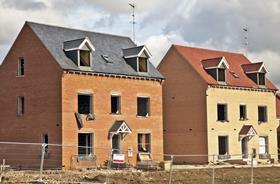Chancellor focuses on boosting housing market with cash pledge, new target of 300,000 homes per year and scrapping stamp duty for most first time buyers

Chancellor Philip Hammond has made a £15bn package of measures to boost the housing market the centrepiece of his first Autumn Budget.
Hammond unveiled a series of measures, including an abolition of stamp duty for first time buyers of homes worth £300k or less, designed to move housebuilding rates toward a new target of 300,000 homes per year.
Fomer cabinet minister Oliver Letwin will undertake a review of the gap between the number of permissions granted each year and the number of homes ultimately built out, and Hammond said the commitments meant at least £44bn would be spent on housing over the next five years.
In addition to the housing measures, Hammond announced progress on city deals, a new partnership between the government the CBI and trade unions to boost construction skills, and a £8bn expansion of the £23bn National Productivity Investment Fund set up a year ago to invest in infrastructure.
By choosing to build we send a message to the next generation that getting on the housing ladder is not just a dream of your parents’ past, but a reality for your future
Philip Hammond
In his speech to MPs, Hammond said the Budget delivered on prime minister Theresa May’s recent pledge to dedicate her premiership to fixing the broken housing market. He said: “Today we take the next steps to delivering on that pledge.
“By choosing to build we send a message to the next generation that getting on the housing ladder is not just a dream of your parents’ past, but a reality for your future.”
Housing measures in the package include a £1.1bn Land Assembly Fund, £2.7bn further for the Housing Infrastructure Fund, £630m for the remediation of small sites, and £8bn of government guarantees to underwrite loans to small builders.
In addition to funding, the speech included proposed planning reforms, such as setting minimum densities for city centre schemes, forcing councils to consider planning applications on sites outside of their local plan allocations where a high proportion of homes are for first time buyers, and strengthening the proposed Housing Delivery Test which frees up planning in areas where the required number of homes aren’t built.
Overall, Hammond says his Budget, which included downgrades to official projections for growth, productivity and business investment, was designed to “create the homes and the infrastructure our country needs” and “build a Britain fit for the future.”


























No comments yet